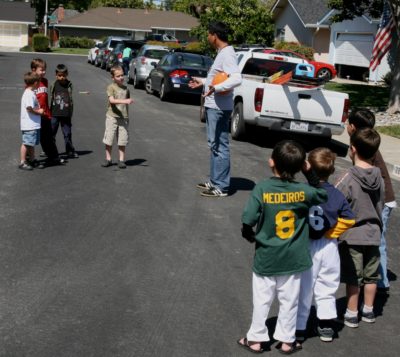
In the agonizing moments before their names are called, those last boys picked for the kickball or basketball team during gym, or its un-legislated twin—recess—are getting a tutorial in what it means to be considered a liability. Alternating turns, the team captains—boys chosen for their athletic prowess or popularity or both—pick from among the rest of the bunch their next team player. Eventually, there are only three or four boys left. Then there’s just one.
Boys who don’t like to play sports, or who aren’t good at them, are terribly disadvantaged growing up in a culture like ours that prizes physical prowess and a confident, macho bearing. There isn’t much we can do as parents or educators to alter the natural drive for social ordering among children, but we can at least eliminate practices—such as allowing kids to pick teams in this manner—that both expose and exploit the vulnerability of these non-athletic boys.
There are some other things we can do at school as well to level out the playing field a little bit. They require an active group of parents and an open-minded administration that will appreciate the experience of non-sporty boys, and make a commitment to accommodating their level of athleticism and interest in order to provide a truly and comprehensively respectful place for learning and play. Four ideas for accommodating non-athletic boys in elementary education:
- Parents can encourage their child’s school to provide game activities for kids who don’t like high-exertion activities but who also don’t want to get stuck with only the swings as an alternative. Games like knock hockey, air hockey, and foosball offer great alternatives and safe havens for boys who are looking for non-contact, interactive activities or who simply need to be doing something. An industrious parent-teacher association can find secondhand tables through its own parent network, Craigslist, or yard sales.
- In place of traditional gym activities that favor the naturally athletic boys, schools could adopt short-session modules in which parent or teacher volunteers run programs on introductory fencing, raft making, or boomerang throwing—novel activities that draw on a variety of skill sets.
- Schools can also be encouraged to identify boys a grade or two older who could be responsible for making sure everyone has something to do during recess and other unstructured times (lunch, waiting to be dismissed to the buses). These boys would be the same kinds of kids who are invited to be hallway guards, guides for new students, and the like. With kids so very anxious these days about being left by themselves and thus identified as “losers,” knowing that there’s a safe, older student to even stand around with if necessary provides some measure of relief.
- Several websites list a number of games and other activities that reward a broader range of physical skills than do traditional sports, and focus on ensuring that everyone has a role to fill. One such example is http://www.pegames.org/full-length.
Want to know more? Check out The Last Boys Picked: Helping Boys Who Don’t Play Sports Survive Bullies and Boyhood.
As an Amazon Associate I earn from qualifying purchases.






